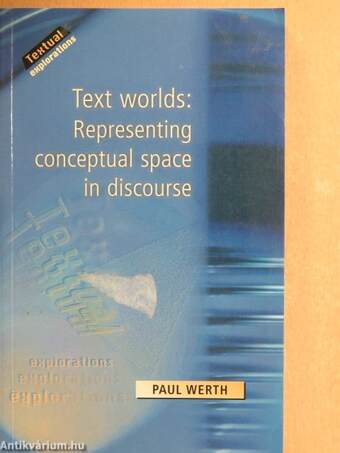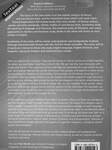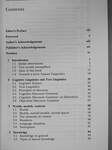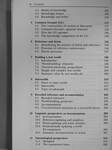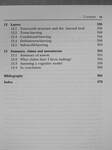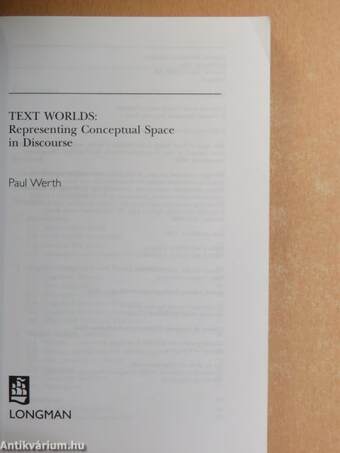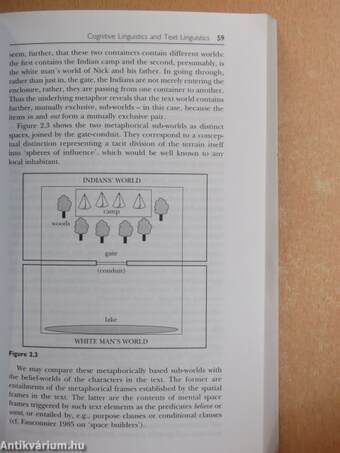1.063.610
kiadvánnyal nyújtjuk Magyarország legnagyobb antikvár könyv-kínálatát

VISSZA
A TETEJÉRE
JAVASLATOKÉszre-
vételek
Text worlds: Representing Conceptual Space in Dicsourse
| Kiadó: | Pearson Education Limited-Longman |
|---|---|
| Kiadás helye: | Harlow |
| Kiadás éve: | |
| Kötés típusa: | Ragasztott papírkötés |
| Oldalszám: | 390 oldal |
| Sorozatcím: | Textual explorations |
| Kötetszám: | |
| Nyelv: | Angol |
| Méret: | 22 cm x 14 cm |
| ISBN: | 0-582-22914-6 |
| Megjegyzés: | Fekete-fehér ábrákkal. |
naponta értesítjük a beérkező friss
kiadványokról
naponta értesítjük a beérkező friss
kiadványokról
Fülszöveg
The focus of this new series is on the stylistic analysis of literary
and non-literary texts, and the theoretical issues which such work raises.
Textual Explorations will include books that cover studies of literary authors, genres and other groupings, stylistic studies of non-literary texts, translation study, the teaching of language and literature, the empirical study of literature, and corpus approaches to stylistics and literature study. Books in the series will centre on texts written in English.
Readership of the series will be mainly undergraduate and postgraduate students, although advanced sixth formers will also find the books accessible. The series will be of particular interest to those who study English language, English literature, text linguistics, discourse analysis, and communication studies.
Texts are apparently mundane. They merely consist of sets of sentences linked together. Yet when we read those texts they come to life. We can see this most obviously... Tovább
Fülszöveg
The focus of this new series is on the stylistic analysis of literary
and non-literary texts, and the theoretical issues which such work raises.
Textual Explorations will include books that cover studies of literary authors, genres and other groupings, stylistic studies of non-literary texts, translation study, the teaching of language and literature, the empirical study of literature, and corpus approaches to stylistics and literature study. Books in the series will centre on texts written in English.
Readership of the series will be mainly undergraduate and postgraduate students, although advanced sixth formers will also find the books accessible. The series will be of particular interest to those who study English language, English literature, text linguistics, discourse analysis, and communication studies.
Texts are apparently mundane. They merely consist of sets of sentences linked together. Yet when we read those texts they come to life. We can see this most obviously with novels and stories. The sentences of fictional texts are gateways through which we can 'see' new worlds. We can see scenes, and know how people and objects in those scenes are positioned in relation to one another. For example, on Christmas morning in A Christmas Carol by Charles Dickens we can imagine the street where Scrooge lives and see him at the window instructing the boy he has stopped in the sunlit street below to go to the poulterer's to buy the prize turkey. We can also 'update' those scenes, when they are affected by natural events and the actions of the characters. For example, we can imagine the changing scene as the boy hurries back to Scrooge overburdened with the enormous turkey he has bought for him.
In this challenging book Professor Paul Werth provides a theory of how we manage to see the worlds of texts through reading their sentences. He shows the complex ways in which readers interact with texts, bringing along shared knowledge of both language and the world to do so. He examines extracts from particular texts in considerable detail to explain how text worlds are built up as we read. In so doing, he sheds new light on a wide range of aspects of textual understanding, including text and discourse analysis, discourse presentation, textual deixis, textual reference and presupposition, theories of how shared knowledge operates and aspects of cognitive linguistics, including mental spaces and metaphor.
Text Worlds will be of interest and use to both undergraduate and postgraduate students of language, literary criticism and literary theory, as well as linguists studying literature and texts.
www.awl-he.com
The Late Paul Werth was formerly Professor of English Linguistics at the University of Amsterdam.
Vissza
Témakörök
Paul Werth
Paul Werth műveinek az Antikvarium.hu-n kapható vagy előjegyezhető listáját itt tekintheti meg: Paul Werth könyvek, művekMegvásárolható példányok
Nincs megvásárolható példány
A könyv összes megrendelhető példánya elfogyott. Ha kívánja, előjegyezheti a könyvet, és amint a könyv egy újabb példánya elérhető lesz, értesítjük.



